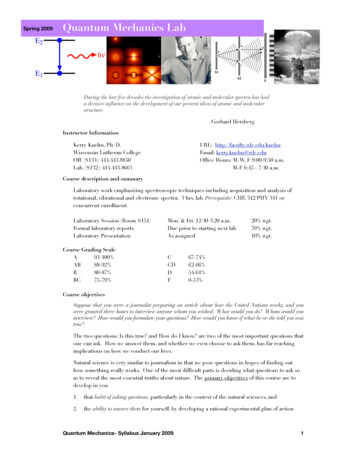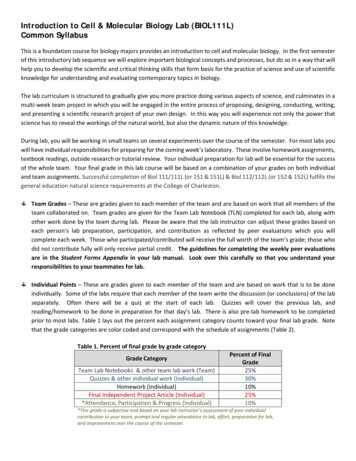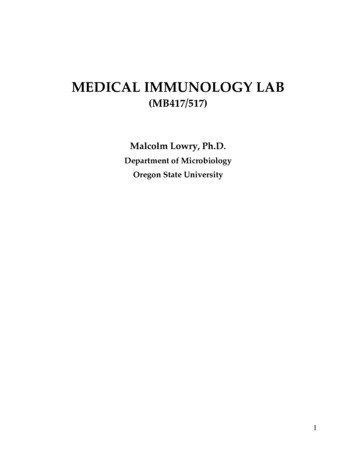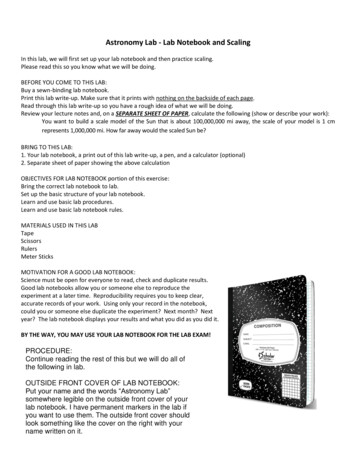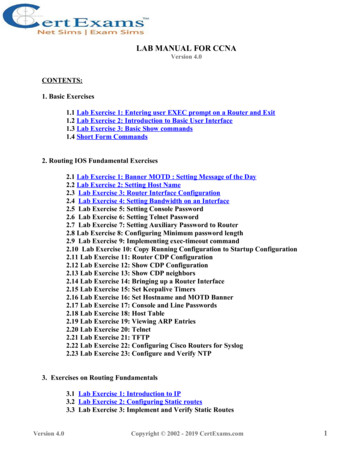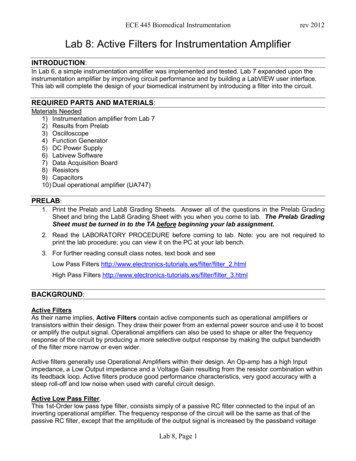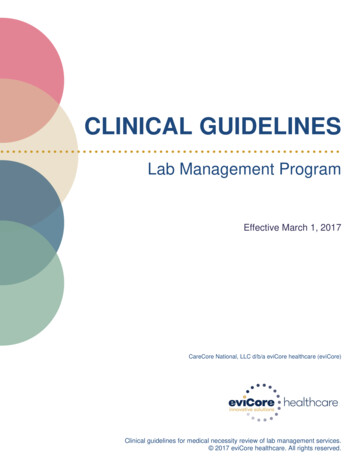
Transcription
CLINICAL GUIDELINESLab Management ProgramEffective March 1, 2017CareCore National, LLC d/b/a eviCore healthcare (eviCore)Clinical guidelines for medical necessity review of lab management services. 2017 eviCore healthcare. All rights reserved.
Lab Management GuidelinesV1.0.2017Please note the following:CPT Copyright 2015 American Medical Association. All rights reserved.CPT is a registered trademark of the American Medical Association. 2017 eviCore healthcare. All Rights Reserved.2 of 511400 Buckwalter Place Boulevard, Bluffton, SC 29910 (800) 918-8924www.eviCore.com
Lab Management GuidelinesV1.0.2017Please note the following:All information provided by the NCCN is “Referenced with permission fromthe NCCN Clinical Practice Guidelines in Oncology (NCCN Guidelines ) 2016 National Comprehensive Cancer Network. The NCCN Guidelines and illustrations herein may not be reproduced in any form for any purposewithout the express written permission of the NCCN. To view the mostrecent and complete version of the NCCN Guidelines, go online toNCCN.org.” 2017 eviCore healthcare. All Rights Reserved.3 of 511400 Buckwalter Place Boulevard, Bluffton, SC 29910 (800) 918-8924www.eviCore.com
Lab Management GuidelinesV1.0.2017Dear Provider,This document provides detailed descriptions of eviCore’s basic criteria for laboratoryservices. These criteria are used for the certification of requests and administration oflaboratory benefits for our clients for a range of laboratory tests some of which arerepresented by one CPT or HCPCS code and others represented by several codes.They have been carefully researched and are continually updated in order to beconsistent with the most current evidence-based guidelines and recommendations forlaboratory testing from national and international medical societies and evidence-basedmedicine research centers. In addition, the criteria are supplemented by informationpublished in peer reviewed literature. If you believe that our criteria require modification,please send suggested changes with supporting references to the LaboratoryManagement Program at the address listed below.Our health plan clients review the development and application of these criteria. EveryeviCore health plan client develops a unique list of CPT codes that are part of theirutilization management programs. Health Plan medical policy supersedes eviCore whenthere is conflict with the eviCore criteria and the health plan medical policy. If you areunsure of whether or not a specific health plan has made modifications to these basiccriteria in their medical policy please contact the plan or access the plan’s website foradditional information.eviCore works hard to make your clinical review experience a pleasant one. For thatreason, we have peer reviewers available to assist you should you have specificquestions about a procedure. For your convenience, eviCore’s Customer Servicesupport is available from 7 a.m. to 7 p.m. Our toll-free number is 1-800-918-8924.Gregg P. Allen, M. D. FAAFPEVP and Chief Medical Officer 2017 eviCore healthcare. All Rights Reserved.4 of 511400 Buckwalter Place Boulevard, Bluffton, SC 29910 (800) 918-8924www.eviCore.com
Lab Management GuidelinesV1.0.2017General Information about This PolicyManualDescriptionThe eviCore healthcare (eviCore) policy manual contains medical and reimbursementpolicies that are created and approved by eviCore’s Laboratory Management Programpersonnel and policy advisors, internal Medical Advisory Committee, and externalMedical Advisory Board. eviCore’s polices are created using evidence-based medicineincluding, but not limited to, professional society guidelines, consensus statements, andpeer-reviewed literature. eviCore’s policies are intended to provide a library for adoptionor a basis for development of tailored coverage criteria for a Health Plan.PurposeTo establish evidence-based definitions, decision support, medical necessity criteria,coverage limitations, and payment rules for molecular and genetic testing.This manual is organized into the following sections:Molecular and Genetic Clinical Use PoliciesThe policies in this section are intended to provide general policy guidance for thecommon settings and scenarios in which genetic testing is used (e.g. prenatal,diagnostic, cancer). These policies address the overarching coverage principles thatbroadly apply based on the purpose of the test. They also address specific usesituations that may apply to many different tests (e.g. predictive testing for a knownfamilial mutation).Each of these overarching policies includes an inventory of all available test-specificpolicies that apply to that use. For example, the Pharmacogenomic Testing policyincludes a list of all policies for tests that may be used to assess drug response ortoxicity risk. Because tests can be used for multiple purposes, the same test-specificpolicy may be referenced by more than one Clinical Use Policy. However, when a testspecific policy is not available, the overarching coverage principles found in theseClinical Use Policies may be applied.Molecular and Genetic Test Specific PoliciesThe policies in this section address a test or group of tests that are used to assesssome health condition. The purpose of these policies is to provide a framework fordetermining medical necessity and coverage determinations for a specific test, includingwhere more limited testing may be supported by the medical evidence when broadertesting is not. These policies provide background about each condition, the availabletests, the scenarios in which the test may be used, and the evidence used to determinemedical necessity criteria. 2017 eviCore healthcare. All Rights Reserved.5 of 511400 Buckwalter Place Boulevard, Bluffton, SC 29910 (800) 918-8924www.eviCore.com
Lab Management GuidelinesV1.0.2017GlossaryThis glossary contains definitions for common genetics, medical and laboratoryterminologyAdministrative PoliciesIf applicable for this plan, administrative policies are included that define coding andreimbursement criteria and requirements.Limitations and RestrictionsWhen using this manual in electronic or printed form, the following restrictions apply: Evidence-based genetic testing is defined as the identification of targeted geneticsequences within the genome of an individual with clinically-identified risk factors ortraits suspected of being specific to the genetic disorder, condition, or trait underinvestigation. The medical policies contained in this manual are the proprietary property ofeviCore, for use by its clients only. These medical policies may not be posted,shared, altered, cited or reproduced without the express written consent of eviCore.Commercial use of these policies is prohibited. Medical policies are not to be considered medical advice for a specific patient.Policies are used in the process of determining whether a service may be medicallynecessary and eligible for coverage. Medical Policies are interpreted and applied at the sole discretion of the Health Plan. Current Procedural Terminology (CPT ) codes and descriptions are the property ofthe American Medical Association with all rights reserved. 2017 eviCore healthcare. All Rights Reserved.6 of 511400 Buckwalter Place Boulevard, Bluffton, SC 29910 (800) 918-8924www.eviCore.com
Lab Management GuidelinesV1.0.2017Table of ContentsPolicyPageMolecular and Genetic Clinical Use Policies. 10Genetic Testing for Cancer Susceptibility and Hereditary Cancer Syndromes . 11Genetic Testing for Carrier Status . 13Genetic Testing for Non-Medical Purposes . 16Genetic Testing for Prenatal Screening and Diagnostic Testing . 18Genetic Testing for the Screening, Diagnosis, and Monitoring of Cancer . 21Genetic Testing to Diagnose Non-Cancer Conditions . 23Genetic Testing to Predict Disease Risk . 25Genetic Testing by Multigene Panels . 27Investigational and Experimental Molecular/Genomic Testing . 32Pharmacogenomic Testing for Drug Toxicity and Response. 38Preimplantation Genetic Screening and Diagnosis . 40Molecular and Genetic Test-Specific Policies . 434Kscore for Prostate Cancer Risk Assessment . 44ABL Tyrosine Kinase Sequencing for Chronic Myeloid Leukemia. 47Afirma Gene Expression Classifier for Thyroid Cancer . 50AlloMap Gene Expression Profiling For Heart Transplant Rejection . 54Alpha-1-Antitrypsin Deficiency Testing . 58Amyotrophic Lateral Sclerosis (ALS) Genetic Testing . 61Angelman Syndrome Testing . 68Anser ADA and Anser IFX . 75APOE Variant Analysis for Alzheimer Disease . 78Ashkenazi Jewish Carrier Screening . 81Ataxia-Telangiectasia . 88BCR-ABL Testing for Chronic Myeloid Leukemia . 92Bloom Syndrome Testing . 95BRAF Testing for Colorectal Cancer . 101BRAF Testing for Melanoma Kinase Inhibitor Response . 103BRCA Ashkenazi Jewish Founder Mutation Testing . 106BRCA Known Familial Mutation Analysis . 111BRCA1/2 Deletion/Duplication Analysis . 114BRCA Sequencing . 118BRCA Sequencing for Olaparib Response . 125Brugada Syndrome Known Familial Mutation Analysis . 129Brugada Syndrome Multigene Panels . 133Brugada Syndrome Sequencing . 137CADASIL Known Familial Mutation Analysis . 141CADASIL Testing . 145Canavan Disease Testing . 149Celiac Disease Testing . 154CellSearch Circulating Tumor Cell Count for Breast Cancer Prognosis . 156Charcot-Marie-Tooth Neuropathy Testing Panel . 158Chromosomal Microarray Testing For Developmental Disorders . 162Chromosomal Microarray for Prenatal Diagnosis . 167Chromosome Analysis for Blood, Bone Marrow, and Solid Tumor Cancers . 171Cologuard Screening for Colorectal Cancer . 173ConfirmMDx for Prostate Cancer Risk Assessment . 178Corus CAD for Obstructive Coronary Artery Disease . 181CYP2C9 and VKORC1 Testing for Warfarin Response . 187CYP2C19 Variant Analysis for Clopidogrel Response . 191 2017 eviCore healthcare. All Rights Reserved.7 of 511400 Buckwalter Place Boulevard, Bluffton, SC 29910 (800) 918-8924www.eviCore.com
Lab Management GuidelinesV1.0.2017CYP2D6 Variant Analysis for Tamoxifen, Tetrabenazine, or Eliglustat Response . 196Cystic Fibrosis Testing . 200Dentatorubral-Pallidoluysian Atrophy Testing . 207DPYD Variant Analysis for 5-FU Toxicity . 211Duchenne & Becker Muscular Dystrophy Testing . 214Early Onset Familial Alzheimer Disease (EOFAD) Genetic Testing. 218EGFR Testing for Non-Small Cell Lung Cancer TKI Response . 223Expanded Carrier Screening Panels . 227Factor II/Prothrombin Testing for Thrombophilia . 233Factor V Leiden Testing for Thrombophilia . 237Familial Adenomatous Polyposis Testing . 244Familial Hypercholesterolemia Genetic Testing. 249Familial Malignant Melanoma Testing . 257Fragile X Associated Tremor/Ataxia Syndrome Testing . 261Fragile X Syndrome Testing. 264Gaucher Disease Testing. 268Hereditary Cancer Syndrome Multigene Panels . 274Hereditary Hemochromatosis Testing . 289HIV Tropism Testing for Maraviroc Response . 292HLA-B*1502 Variant Analysis for Carbamazepine Response . 295HLA-B*5701 Genotyping for Abacavir Hypersensitivity . 298Huntington Disease Testing . 302Hypertrophic Cardiomyopathy Testing . 305KRAS Testing for Anti-EGFR Response in Metastatic Colorectal Cancer . 312Leber Hereditary Optic Neuropathy (LHON) Genetic Testing . 315Li-Fraumeni Syndrome Testing . 321Liquid Biopsy Testing – Solid Tumors . 325Long QT Syndrome Testing . 329Lynch Syndrome Genetic Testing . 334Lynch Syndrome Tumor Screening - First-Tier . 344Lynch Syndrome Tumor Screening - Second-Tier . 350Mammaprint 70-Gene Breast Cancer Recurrence Assay . 355Mammostrat Breast Cancer Recurrence Assay. 359Marfan Syndrome Genetic Testing . 362Mitochondrial Encephalomyopathy, Lactic Acidosis, and Stroke-like Episodes (MELAS) GeneticTesting. 369MGMT Testing for Malignant Glioma Alkylating Agent Response . 376MTHFR Variant Analysis for Hyperhomocysteinemia . 378MUTYH Associated Polyposis Testing . 381Niemann Pick Disease Types A & B Testing . 387Niemann Pick, Type C Testing. 392Non-Invasive Prenatal Testing . 398OncotypeDX for Breast Cancer Prognosis . 403OncotypeDX for Colorectal Cancer Recurrence Risk . 409PCA3 Testing for Prostate Cancer . 413Peutz-Jeghers Syndrome Testing . 416PTEN Hamartoma Tumor Syndromes Testing . 420Prader-Willi Syndrome Testing . 427Prenatal Aneuploidy FISH Testing . 432Prenatal Chromosome Analysis . 435Prenatal Maternal Serum Screening . 438Prolaris for Prostate Cancer Prognosis . 441Prosigna Breast Cancer Prognostic Gene Signature Assay. 445Rett Syndrome Testing . 449Spinal Muscular Atrophy Testing . 453Thoracic Aortic Aneurysms and Dissections (TAAD) Panel Testing . 460 2017 eviCore healthcare. All Rights Reserved.8 of 511400 Buckwalter Place Boulevard, Bluffton, SC 29910 (800) 918-8924www.eviCore.com
Lab Management GuidelinesV1.0.2017Tay-Sachs Disease Testing . 466Tissue of Origin Testing for Cancer of Unknown Primary. 473TPMT Testing for Thiopurine Drug Response . 476Tumor Marker Testing-Solid Tumors . 480UGT1A1 Mutation Analysis for Irinotecan Response . 486VeriStrat Testing for NSCLC TKI Response . 489Von Hippel-Lindau Disease Testing . 492Glossary . 497Administrative Policies. 508Molecular Pathology Tier 2 Molecular CPT Codes . 509 2017 eviCore healthcare. All Rights Reserved.9 of 511400 Buckwalter Place Boulevard, Bluffton, SC 29910 (800) 918-8924www.eviCore.com
Lab Management GuidelinesV1.0.2017Molecular and GeneticClinical Use Policies 2017 eviCore healthcare. All Rights Reserved.10 of 511400 Buckwalter Place Boulevard, Bluffton, SC 29910 (800) 918-8924www.eviCore.com
Lab Management GuidelinesV1.0.2017Genetic Testing for CancerSusceptibility and Hereditary CancerSyndromesMOL.CU.109.ADescriptionGenetic testing for cancer susceptibility and hereditary cancer syndromes is performedin people with known risk factors for an inherited form of cancer. Testing may be used inpeople diagnosed with cancer when there are “red flags” in the person’s personalmedical and/or family history for a hereditary form. Predictive genetic testing may alsobe performed for this group of conditions, in people known to be at increased risk ofdeveloping an inherited condition based on their family history. A positive genetic testresult increases the risk for cancer (types vary by the gene involved) and, therefore,impacts medical management decisions around screening, prevention, and treatment. Tests used to screen for or make a diagnosis of cancer are covered separatelyas Genetic Testing for the Screening, Diagnosis, and Monitoring of Cancer. This policy does not address diagnostic or predictive testing for conditions otherthan hereditary cancer. Refer to Genetic Testing to Diagnose Non-CancerConditions and Genetic Testing to Predict Disease Risk for those purposes.Criteria: General Coverage GuidanceIndividuals may be considered for genetic testing for hereditary cancer syndromes whenALL of the following conditions are met: Technical and clinical validity: The test must be accurate, sensitive andspecific, based on sufficient, quality scientific evidence to support the claims ofthe test. Clinical utility: Healthcare providers can use the test results to providesignificantly better medical care for the individual. Reasonable use: The usefulness of the test is not significantly offset by negativefactors, such as expense, clinical risk, or social or ethical challenges.Limits: Testing will be considered only for the number of genes or tests necessary toestablish carrier status. A tiered approach to testing, with reflex to more detailedtesting and/or different genes, will be required when clinically possible. Genetic testing is indicated once per lifetime per condition. Exceptions may beconsidered if technical advances in testing demonstrate significant advantagesthat would support a medical need to retest. 2017 eviCore healthcare. All Rights Reserved.11 of 511400 Buckwalter Place Boulevard, Bluffton, SC 29910 (800) 918-8924www.eviCore.com
Lab Management GuidelinesV1.0.2017Criteria: Special CircumstancesThe following policies address a group of tests that are used for similar purposes.Because a variety of tests may be used, but the circumstances that justify testing arethe same, individual test-specific policies are not necessary.Predictive testing for at-risk people with known familial mutationsThe genetic mutation(s) associated with a hereditary cancer syndrome can often bedefined in an affected family member, allowing for testing of at-risk relatives for thosespecific mutations. Testing for known familial mutations is reasonable when ALL of thefollowing conditions are met: The mutation(s) in the family have been clearly defined by previous genetictesting and information about those mutations can be provided to the testinglab. Technical and clinical validity: The test must be accurate, sensitive andspecific to the familial mutations. Clinical utility: Healthcare providers can use the test results to providesignificantly better medical care for the individual. Reasonable use: The usefulness of the test is not significantly offset by negativefactors, such as expense, clinical risk, or social or ethical challenges.Limits: Testing will be considered only for the known familial mutations when clinicallypossible. Predictive genetic testing is indicated once per lifetime per condition. Predictive genetic testing will be considered only for adult individuals (age 18 andover). Exceptions may be considered if there are medical management and/orsignificant psychosocial benefits to testing prior to adulthood.1,2Test-specific policies are available for some hereditary cancer syndrome tests. Pleasesee the policy manual for a list of test-specific policies. For tests without a specificpolicy, use the General Coverage Guidance in Section 1.References1.2.Ross LF, Saal HM, David KL, Anderson RR. Technical report: ethical and policy issues ingenetic testing and screening of children. Genet Med 2013;15:234–245. Available m2012176a.pdfNational Society of Genetic Counselors Position Statement. Genetic testing of minors foradult-onset conditions. Adopted 2012. Available at: http://nsgc.org/p/bl/et/blogaid 28. 2017 eviCore healthcare. All Rights Reserved.12 of 511400 Buckwalter Place Boulevard, Bluffton, SC 29910 (800) 918-8924www.eviCore.comHereditary CancerCriteria: Test-specific Policies
Lab Management GuidelinesV1.0.2017Genetic Testing for Carrier StatusMOL.CU.110.ADescriptionCarrier screening is performed to identify genetic risks that could impact reproductivedecision-making for parents or prospective parents. Carriers are generally not affectedbut have an increased risk to have a child with a genetic condition. Carrier screeningmay be available for autosomal recessive conditions, X-linked conditions, and certainchromosome abnormalities. Ideally, carrier screening is performed prior to pregnancy sothat a full range of reproductive options are available to an at-risk couple. However, inpractice, it is often performed early in pregnancy when prenatal care is established. This policy does not include prenatal or preimplantation genetic testing. Refer topolicies on Genetic Testing for Prenatal Screening and Diagnostic Testing andPreimplantation Genetic Screening and Diagnosis for those purposes.In addition, testing that may identify carriers who have clinical signs andsymptoms (e.g., cystic fibrosis testing for men with congenital absence of the vasdeferens, fra
General Information about This Policy Manual Description . The eviCore healthcare (eviCore) policy manual contains medical and reimbursement policies that are created and approved by eviCore's Laboratory Management Program

